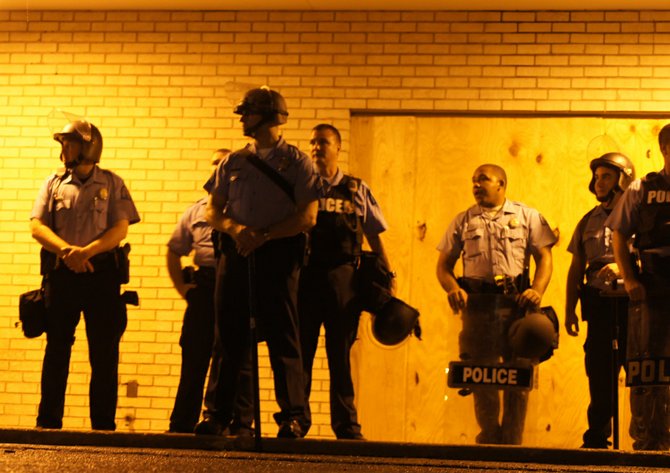Members of the St. Louis Police Department stand by on the first night of a a curfew that Missouri Gov. Jay Nixon ordered. Approximately 15 law-enforcement agencies were called to assist during protests. Photo by R.L. Nave.
FERGUSON, Mo. (AP) — City leaders in Ferguson, where the fatal shooting of an unarmed black 18-year-old by a white police officer sparked days of sometimes violent protests, say they will establish a review board to help guide the police department and make other changes to fix the city's relationship with its residents.
The Ferguson City Council was set to meet Tuesday for the first time since the Aug. 9 shooting of Michael Brown by officer Darren Wilson. The shooting exposed an undercurrent of racial unrest in Ferguson and other nearby suburbs in mostly black communities of north St. Louis County.
Changes the City Council plans to make include reducing the revenue from court fines used for general city operations and reforming court procedures, according to a statement from a public relations firm hired by Ferguson. Critics say reliance on court revenue and traffic fines to fund city services more heavily penalizes low-income defendants who can't afford private attorneys and who are often jailed for not promptly paying those fines.
"The overall goal of these changes is to improve trust within the community and increase transparency, particularly within Ferguson's courts and police department," Councilman Mark Byrne said in the statement. "We want to demonstrate to residents that we take their concerns extremely seriously."
The U.S. Justice Department announced last week that it was launching a broad investigation into the Ferguson Police Department, looking for patterns of discrimination. That inquiry is separate from the one into Brown's death, which a local grand jury is also investigating.
Ferguson, a city of 21,000, is about 70 percent black. Its 53-member police department has just three black officers. The mayor and five of the six City Council members are white.
A 2013 report by the Missouri attorney general's office found that Ferguson police stopped and arrested black drivers nearly twice as often as white motorists, but were less likely to find contraband among the black drivers.
In the last fiscal year, court fines and fees accounted for $2.6 million, or nearly one-fifth of the city budget. That's nearly twice as much as the city collected two years earlier.
ArchCity Defenders, a St. Louis legal group that represents indigent defendants, recently singled out courts in Bel-Ridge, Ferguson and Florissant as "chronic offenders" among a group of 30 municipal courts where problems were documented.
In Ferguson, defendants described a system so overwhelmed by crowds that bailiffs would lock the door five minutes after the scheduled start time —then issue failure to appear warrants for those who arrived late.
Police have said the shooting of Brown came followed a scuffle after Wilson told Brown and a friend to move out of the street and onto a sidewalk. Some witnesses have reported seeing Brown's arms in the air before the shooting. Autopsies concluded he was shot at least six times.
On Tuesday morning, Brown's parents joined about 20 supporters and activists at a press conference outside police headquarters to reiterate their calls for Wilson's immediate arrest.
Associated Press writer Nigel Duara contributed to this report.
Copyright Associated Press. All rights reserved. This material may not be published, broadcast, rewritten, or redistributed.



Comments